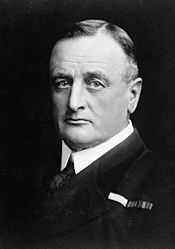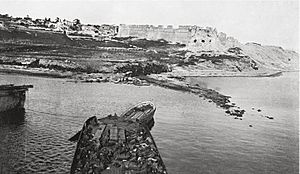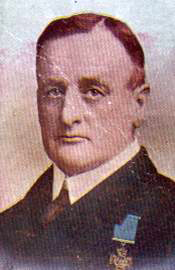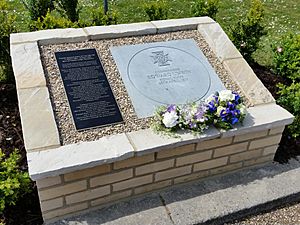Edward Unwin facts for kids
Quick facts for kids
Edward Unwin
|
|
|---|---|
 |
|
| Born | 20 April 1864 Fawley, Hampshire |
| Died | 19 April 1950 (aged 85) Hindhead, Surrey |
| Buried |
St Luke's Churchyard, Grayshott
|
| Allegiance | United Kingdom |
| Service/ |
Royal Navy |
| Years of service | 1895–1909 1914–1920 |
| Rank | Captain |
| Commands held | HMS Hussar HMS Amethyst |
| Battles/wars | Benin Expedition of 1897 Second Boer War First World War |
| Awards | Victoria Cross Companion of the Order of the Bath Companion of the Order of St Michael and St George Order of the Nile, 3rd Class (Egypt) Officer of the Legion of Honour (France) |
Captain Edward Unwin (born April 20, 1864 – died April 19, 1950) was a brave officer in the Royal Navy. He is famous for receiving the Victoria Cross. This is the highest award given for incredible bravery in battle to British and Commonwealth soldiers.
Contents
Edward Unwin was born in Fawley, Hampshire, England, on April 20, 1864. When he was 16, he joined the merchant navy. This meant he worked on ships that carried goods around the world. He spent 15 years sailing on fast ships called clippers for a company named P&O.
In 1895, at the age of 31, Unwin joined the Royal Navy. He was part of a group of experienced merchant sailors brought in to fill a shortage of officers. He served in important missions like the Benin Expedition of 1897 and the Second Boer War.
Unwin retired from the Navy in 1909 as a commander. However, he was called back to duty on July 29, 1914. This was just before the start of the First World War.
Bravery in the First World War
When World War I began, Unwin first worked on the staff of Admiral Sir John Jellicoe. In February 1915, he took command of HMS Hussar. This ship was a torpedo gunboat, a small, fast warship, and was later used to clear sea mines.
The Gallipoli Landing Plan
In 1915, military leaders planned a big landing of troops at Gallipoli. This was a peninsula in Turkey. Unwin came up with a clever idea. He suggested using a large coal-carrying ship, the SS River Clyde, to land 2,000 soldiers all at once. The plan was to beach the ship on a narrow beach at Cape Helles, known as V Beach.
At 51 years old, Unwin was promoted to acting Captain. He was given command of the River Clyde for this very risky operation.
Heroic Actions at V Beach
On April 25, 1915, the River Clyde reached the beach at 6:22 AM. The plan was to use a steam-powered boat to create a bridge from the ship to the shore. But the strong sea current swept this boat away.
Unwin, along with a sailor named William Charles Williams, jumped into the water. They were under heavy fire from Turkish defenders. They worked hard to move two smaller boats into place. They tied them together to form a bridge for the soldiers.
Williams was badly wounded, and Unwin went to help him. While he was helping, the boat he was holding was swept away. Unwin became very cold and tired and had to return to the ship.
After resting for an hour, he went back to help, even though the doctor told him not to. He continued his work until he was wounded again. When the landing attempts stopped, Unwin went out a third time. He risked his life to rescue wounded soldiers from the water near the beach. It is said he saved seven men.
For his incredible bravery, Edward Unwin was awarded the Victoria Cross. The official report of his actions said:
While in SS River Clyde, observing that the lighters which were to form the bridge to the shore had broken adrift, Commander Unwin left the ship, and under a murderous fire attempted to get the lighters into position. He worked on, until suffering from the effects of cold and immersion, he was obliged to return to the ship, where he was wrapped up in blankets. Having in some degree recovered, he returned to his work against the doctor's order and completed it. He was later attended by the doctor for three abrasions caused by bullets, after which he once more left the ship, this time in a lifeboat, to save some wounded men who were lying in shallow water near the beach. He continued at this heroic labour under continuous fire, until forced to stop through physical exhaustion.
—the London Gazette, August 16, 1915
Later War Service
In August, another landing was planned at Suvla Bay. Unwin was put in charge of the landing boats. He was the first to report to the general in charge. He advised against landing more troops because it was dark and there were hidden rocks.
Unwin was also involved in the evacuation of troops from Suvla in December. He was on the very last boat to leave the beach. When a soldier fell overboard, Unwin bravely dived in to rescue him.
In 1916, Unwin took command of HMS Amethyst. He later became a commodore, a senior naval rank.
Later Life and Legacy
Edward Unwin passed away on April 19, 1950. He is buried in Grayshott, Surrey. His Victoria Cross medal is on display at the Imperial War Museum in London. His family loaned it to the museum so others can see it.
A special memorial for Edward Unwin was put up in Hythe, Hampshire, near where he was born. It was unveiled on May 11, 2015, to remember his brave actions 100 years earlier.
 | Emma Amos |
 | Edward Mitchell Bannister |
 | Larry D. Alexander |
 | Ernie Barnes |




